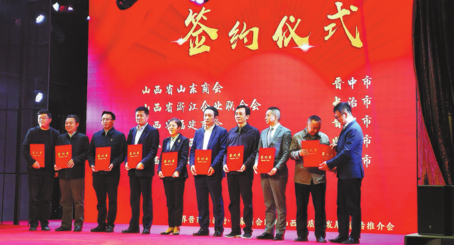Homecoming highlights merchants old and new


Representative Shanxi merchants meet at a networking event in Taiyuan. [Photo by Li Lian for China Daily]
The Shanxi merchants, the first group of Chinese businesspeople piloting the move toward globalization, are always remembered by the people of Shanxi province as well as the rest of country for their hardworking and enterprising spirits and their willingness to pay back to their hometowns.
These pioneers in foreign trade usually started their business as small vendors, selling products like tea and silk to overseas regions. Once they made a fortune, they would return to their home province, making huge investments in improving local education, infrastructure and the livelihoods of their fellow residents.
The Shanxi merchants, or Jinshang, reached their peak of prosperity during the Ming (1368-1644) and Qing (1644-1911) dynasties.
The Jinshang's business began to decline in the late 19th century, when new international trade hubs emerged in China's eastern coasts and sea transportation overtook the traditional overland routes.
But this doesn't mean that the merchants disappeared completely from the historical stage. They have actually branched out, continuing their operations across the world.
And their enterprising spirit and enthusiasm to pay back their hometowns has remained the same.
A recent event in Taiyuan saw the return of Jinshang merchants and their centuries-long values.
The event, called the "Homeward Trip of Hundreds of Jinshang Merchants", was held in the Shanxi provincial capital on April 29, gathering nearly 200 Jinshang representatives from across the world.
According to the organizers of the event, these businesspeople have offered not only suggestions for Shanxi's development, but also proposals for business partnerships.
At the event, Zhang Weidong, chairman of the Shanxi Chamber of Commerce in Germany, introduced the investment possibilities between Shanxi and Germany.
In Germany, the chamber has organized a number of events to publicize Shanxi's business environment and offer networking opportunities for businesspeople from both sides, according to Zhang.
"We will hold more business matchmaking activities in the future, contributing to the high-quality development of Shanxi," Zhang said.
Duan Yong is a Shanxi native who operates a biological science company in the city of Suzhou in East China's Jiangsu province. His company has already invested in several facilities in Shanxi. This time, he said he is looking for further opportunities to invest.
Duan also offered his suggestion on Shanxi's development, saying that local businesspeople should keep close contact with consumer electronics manufacturers in China's coastal regions, who are planning to transfer their production capacities to the country's central and western regions.
Peng Yanwu, chairman of the Association of Shanxi Enterprises in Zhejiang, said the economies of Zhejiang and Shanxi provinces are highly complementary because Zhejiang is strong in capital and research and development resources and Shanxi has rich natural resources.
"Our association will play a role in facilitating the share of resources of both sides," Peng said.
Lyu Liang, secretary-general of the Lyuliang Business Association in Shanghai, promised at the event that his association will bring suppliers and buyers together, helping to introduce more Shanxi specialty products, especially those from the city of Lyuliang, to Shanghai.
Li Lian contributed to this story.







